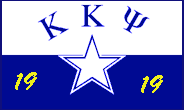|

In the years that followed World War I,
a movement developed among college and university bands, searching for some motivating force that would create a greater interest
in band music. This movement sought expression in an effort to develop good will, fellowship and understanding among bands
and their members, and to recognize the value of dedicated leadership. Seizing upon this idea, ten members of the Oklahoma
A & M College (later to be known as the Oklahoma State University) Band, led by William A. Scroggs and their director,
Bohumil Makovsky, drew up a plan for a national honorary society for college bandsmen.
Director Makovsky selected nine men to work
with Scroggs to organize the first local club. These ten charter members were: A. Frank Martin, Raymond D Shannon, Clyde Haston,
Clayton Soule, Carl Stevens, William Coppedge, Dick Hurst, Asher Hendrickson, and Iron H Nelson. Officers for the local club
were elected and William Scroggs was selected as president.
With the local organization complete, a corporation was
formed which petitioned the Oklahoma Corporation Commission for a charter. The charter was granted November
27, 1919, and "Kappa Kappa Psi, Honorary Fraternity for
College Bandsmen," was established on the Oklahoma State University campus with the local group being known as the "Alpha
Chapter."
During the first year of operation as an honorary society
the members were kept busy working out and adopting a national constitution, creating and developing the Ritual ceremony,
designing the jewelry needed to provide distinctive recognition for the organization, and setting up plans for the expansion
of the Fraternity. The Greek name and symbols, "Kappa Kappa Psi," were
furnished by Dr. Hilton Ira Jones of the OSU Chemistry faculty, and assistance in the final organization was furnished by
Col. F.D. Wickham of the OSU Military Department.
No person is so important to any organization as its constant
companion, inspiration, and source of support. Such a man was Bohumil Makovsky, Director of Bands and Head of the Music Department
at Oklahoma State University from 1915 until 1945. Affectionately referred to by all who knew him as "Boh," Makovsky provided
the strength and encouragement needed by William Scroggs and those nine other bandsmen which saw them successfully through
the establishment of a national fraternal society.
Founded by bandsmen for the band member, Kappa
Kappa Psi was (and is) a tribute to the dynamic personality of one man. For around this
personality there grew a core of student leaders committed to assist him in a program of developing the best college band
with the highest performance standards possible. "Boh" was that man, and each incoming member of this Fraternity should be
familiar with the man who was officially recognized by the Grand Chapter in Convention assembled as "The Guiding Spirit of
Kappa Kappa Psi."
|
|
 |
|
|
WHAT IS KAPPA KAPPA PSI?
Kappa Kappa Psi
is a fraternal organization that promotes the advancement of college and university bands through dedicated service and support
to bands; comprehensive education; leadership opportunities; and recognition; for the benefit of its members and society.
Kappa Kappa Psi
operates primarily as a student service and leadership recognition society whose chief aim is to assist the Director of Bands
in developing the leadership and enthusiasm that is required of his/her band. Our goals are to provide the band not only with
organized and concentrated service activities, but to give our membership valid and wholesome experiences in organization,
leadership and social contracts. The honorary nature of membership is based on our premise that "it is an honor to be selected
to serve" this band, its department of music, its sponsoring institution, and the cause of band music in the nation's colleges
and universities.
The Fraternity is presently located in over 150 colleges and universities.
Since 1919 more than 50,000 interested bandmembers have devoted their efforts to strengthening their bands through group and
individual service projects. The Fraternity's program of continued service to Music has attracted the attention of the best
in American band tradition. We number among our ranks John Philip Sousa, Karl King, Frank Simon, Herbert L. Clarke, Harold
Bachman, William D. Revelli and many other contemporary composers, conductors, and music educators.
Through its commissioning program, the Fraternity has presented such noted
works as Francis McBeth's "The Seventh Seal", Claude T. Smith's "Symphony #1 for Band, and Fisher Tull's "Prelude & Double
Fugue."
On the local level, chapter responsibilities include numerous concentrated
service projects as well as providing the intangible items of morale, spirit, enthusiasm, atmosphere, and attitude within
the band. As noted in the preamble of our Constitution and as charged in much of our Ritual, the cultivation and maintenance
of an agreeable and enthusiastic attitude is mandatory for all our members, and this serves to foster the wholesome and cooperative
spirit that each Director of Bands wants for their band |
|
|
|
|
|
| |

|
|

|
|
|

|
|
|
|

|
|
| | |
|
| |

|
|

|
ZetaEta1919@hotmail.com
|

